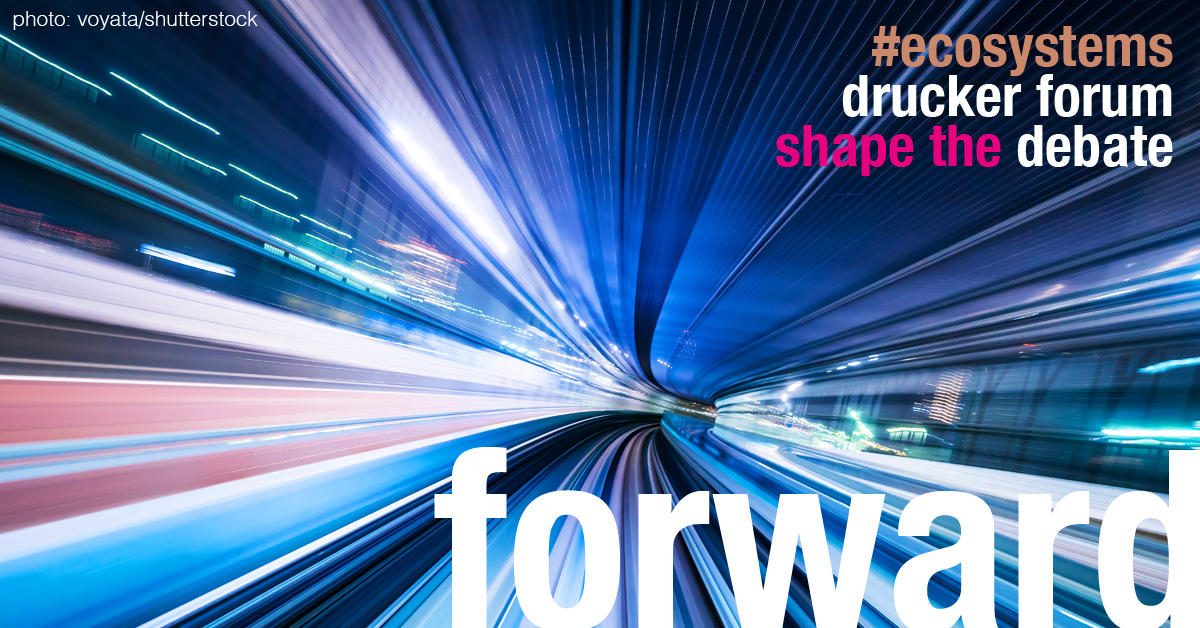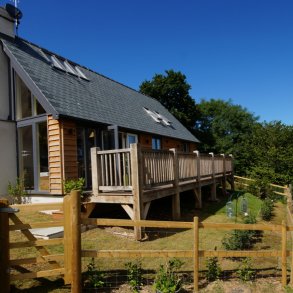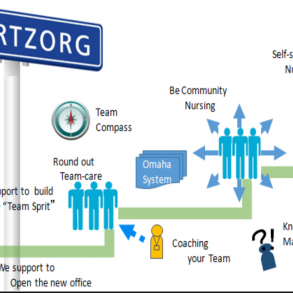By Bill Fischer and Simone Cicero originally posted in 11th Global Peter Drucker Forum
 In this first blog we discuss the status quo and how that might have to change. The second blog shows some examples of ecosystems and the journey still to come.
In this first blog we discuss the status quo and how that might have to change. The second blog shows some examples of ecosystems and the journey still to come.
Value-chains have been a mainstay of organizational strategy; they are designed for reliability, and a well-run value-chain will inevitably reduce operational surprise, but they are also linear and therefore slow and limited in how they respond to a fast changing environment.
Ecosystems however, with many possible partners self-defining how they might interact, are better suited for novelty than for routine, and can be perfect when new ideas or experimentation are required.
Drucker Forum 2019
As we move into a future characterized by hyper-connectivity, there will be an unprecedented opportunity for the sorts of innovative spontaneity that ecosystems excel at to become a competitive differentiator; but they need leadership to think differently regarding strategy and organizational boundaries.
Our work with ecosystem pioneers offers guidance to those managers who will face these choices in the near future, and we highlight some especially intriguing scenarios.
Ecosystems are not new in organizational discussions. The richness of their randomness in promoting sustained vitality in biological communities is well-established, and their possible application to economic activity might provide new forms of expertise in the face of ever-demanding customer expectations, without adding to the balance sheet.
Ecosystem potential is often hiding in plain sight
Many of the ecosystems we are working with were already in place, without being recognized for the potential that they offered to generate ideas. The traditional process-linearity and role-sequentiality of value-chain thinking acts as a limiting factor in envisioning possible sorts of partnering.
One European tier three commodity supplier for the automobile industry has told us that they are stereotyped by the efficiency with which they play their current role. There is no thought given to what they could add in customer experience innovation, and the invitation to redefine their role never comes.
This is a testimony to limited imaginations without tangible evidence of ecosystem possibility. But In Copenhagen, concern over a lack of software design talent was the catalyst that led to public recognition of an already existing, but latent, local ecosystem that was already exceling. Once recognized, it was much easier for stakeholders to invest in its future development, but the recognition was the essential first step.
Leadership imagination is an essential ingredient in such situations, but former head of GE’s business innovations, Beth Comstock, has argued recently that that the ability to “imagine forward” is not as abundant as we might have hoped.
We see ecosystems in nature but our leadership imagination does not inherently make the leap to business as they require a light touch on the strategy wheel allowing generosity in the way in which that value is distributed among partners.
In our next blog, we explore the challenges this produces for existing management thinking, and how that might be changed.
About the authors:
Bill Fischer is Professor of Innovation Management, at IMD business school. He coauthored the book “Reinventing Giants” which describes Haier’s évolution as an innovative organization and he and Simone Cicero have been working with Haier developing the story of Haier’s emergence as an ecosystem participant. He was inducted into the Thinkers50 Hall of Fame in 2019.
Simone Cicero is a designer and facilitator, speaker and entrepreneur, with a special focus on open business models, both in software and in hardware.
Simone created the first completely open source methodology for the design of Platforms and Ecosystems, The Platform Design Toolkit, that has contributed a new design domain emerging.
This article is one in the Drucker Forum “shape the debate” series relating to the 11th Global Peter Drucker Forum, under the theme “The Power of Ecosystems”, taking place on November 21-22, 2019 in Vienna, Austria #GPDF19 #ecosystems
Republished with permission.
Featured Image added by Enlivening Edge Magazine.




